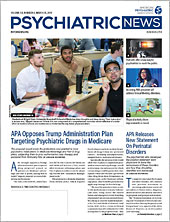With a new Congress getting down to legislative business, there is no time like the present to get involved in advocating for the profession. The 116th Congress has a freshman class of 10 senators and 101 representatives, representing 111 potential new allies for psychiatry.
As lobbyists from all areas of health care jockey for position on Capitol Hill, it’s vital that psychiatrists forge relationships with legislators and add their voices to the discussion, said Dora Wang, M.D., a clinical associate professor and historian at the University of New Mexico School of Medicine.
“Our health care system won’t be reformed until the time-tested ethics of physicians are once again at the center of American medicine rather than the ethics of profit. It’s of utmost importance that physicians are involved in politics,” Wang said.
Wang has long been active in the political arena, supporting U.S. Sen. Martin Heinrich (D-N.M.) since he became a member of the Albuquerque City Council 20 years ago, and New Mexico Gov. Michelle Lujan Grisham (D) since the first time she ran for Congress in 2008. Wang has raised money to help candidates get elected, and she’s not afraid of doing the labor herself: She once spent an entire weekend cooking for a fundraiser for Heinrich, raising $15,000 for his campaign.
“I encourage psychiatrists to know their senators, representatives, and local politicians. They want to know what’s happening in mental health and in health care. By informing our politicians and working with them toward a better health care system, we are helping our patients,” Wang said.
Meeting with elected officials is crucial to success. A 2017 report by the nonpartisan, nonprofit Congressional Management Foundation noted that 94 percent of respondents in a survey of congressional staff said that in-person visits from constituents would have some or a lot of influence on an undecided lawmaker. In that same survey, 98 percent of congressional staff said that meetings between the representative or senator and constituents were either very important or somewhat important, and 99 percent said that meetings between congressional staff and constituents were either very important or somewhat important.
Calling with a quick, direct introduction is an effective approach, Wang said. “State you are a psychiatrist. Let them know that the perspective of psychiatrists is important, and make an appointment to talk with them.”
Wang also suggested seeking out local legislators or potential legislators, as they represent the future of politics and potential allies down the road.
“There may be legislators in your social circle or someone who you feel would be a good lawmaker. Encourage them to run for office,” Wang said. ■

